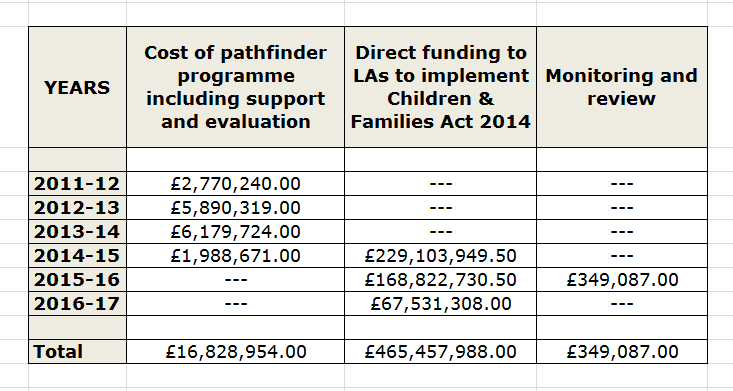Top ranked special educational needs solicitors
Since the beginning of February 2016, we have been chasing the Department for Education for details of the costs of the special educational needs and disability (SEND) reforms. On Friday 18 March we received the answer.
The total figure is staggering.
The total bill, so far, is £482,636,029.00. Nearly half a billion.
The breakdown
The request that we submitted in February was for disclosure as follows:
- The cost to the Department of the pilots operated before the commencement of the Children and Families Act 2014.
- The total direct funding given to local authorities, support agencies and any organisations associated with the implementation of the reforms since the commencement of the Children and Families Act 2014.
- The costs of monitoring and reviewing the reforms.
- The cost to the Department associated with preparing amended advice, guidance and/or other statutory instruments to implement the reforms.
- The total of any other costs that the Department has incurred to implement the reforms which are not covered by 1-4 above.
A full breakdown of the costs can be viewed below.

Special educational needs and disability (SEND) reform costs 2011-2017
Costs of the pilots
Before the Children and Families Act 2014 took force on 1 September 2014, a number of local authorities trialled the new system of Education Health and Care Plans (EHCPs). These pilot contracts started in 2011.
These pilots involved preparing local offers, developing procedures for the Education Health and Care (EHC) needs assessments and preparing EHCPs. These pilot local authorities were tasked with finding the difficulties within the system, reporting back to the DfE and (hopefully) resolving the teething problems.
The contracts ran from 2011 until 2015. The total costs of these pilots runs to £16,828,954.00 – nearly 17 million pounds.
The purpose of the special educational needs and disability reforms was to improve the system. We wrote about the efficacy of the reforms recently. Given that the pilot system was to identity, and resolve, any problems, so far as possible, before the reforms took force, it is questionable whether this was any kind of value for money.
Direct funding to local authorities
Since 2014 the DfE has provided significant funding to local authorities to implement the reforms. The direct funding has covered the following:
- SEN reform grant
- SEN implementation funding
- Funding for Independent Supporters
- Funding for Parent Carer Forums
- Training for Senior SEND managers
- Funding for voluntary and community sector organisations to provide specialist advice
- Funding for specific local authorities to become ‘regional leads’.
As a combination of all of the above, the total direct funding given to local authorities, since 2014, to implement the special educational needs and disabilities reforms is £465,457,988.00.
The above list is non-exhaustive of all the contracts the DfE has entered into to implement the reforms.
Monitoring and review
This is the poor man at the feast.
Much of the social media outcry about the SEND reforms has been the lack of accountability. The starting point for accountability would be monitoring and review.
From the disclosure we have received, monitoring and review contracts are not due to start until May 2016. It is worth highlighting that the DfE has withheld some information relating to monitoring and review contracts because it is subject to competitive tender. However, the disclosed funding for monitoring and review is just £349,087.00.
That means the monitoring and review budget (i.e. accountability) is 0.07% of the funding given to local authorities to implement the reforms.
Costs of guidance and any other costs
The DfE does not hold information relating to the costs of preparing guidance, advice and/or the statutory materials. This information may be available from the Ministry of Justice and would likely increase the costs.
Further, the DfE states that there are no other costs associated with the reforms.
Comparison of costs
So, what does this money mean? Half a billion pounds sounds like a lot money, because it is, but it is almost incomprehensively large. To put it into context then, this is what the DfE / local authorities could have used £482,636,029.00 to buy:
- 80,439 more pupils given a special educational needs delegated budget
- 96,527 assessments of SEN run by local authorities
- 17,587 new teachers through the Teach First programme
- 29,304 new teachers through the PGCSE route
- 80 new schools
- 17,136 teachers’ salaries paid for a year
- 5 million hours of speech and language therapy
- 14,082 educational psychologists’ salaries paid for a year
- 10,437 senior educational psychologists’ salaries paid for a year
- 13,800 occupational therapists / physiotherapists’ salaries paid for a year
Conclusions
There is no doubt that the system of SEN support through the Education Act needed reviewing. The Lamb Inquiry found fundamental systemic difficulties and a lack of transparency.
The point is though, after spending half a billion pounds of tax-payer money, not a lot seems to have changed. Parents are still concerned about the lack of transparency. Appeal success rates are rising, suggesting decision-making is getting ‘worse’. There is a lack of teachers generally, and specifically in special educational needs. There are simply not enough educational psychologist / speech and language therapists / occupational therapists / physiotherapists to support children with SEND.
Bearing in mind all the ongoing difficulties, we wonder whether half a billion pounds could have been used more effectively.
I am so happy at the outcome, I don't think we would have had such a comprehensive service from any other law firm, and you took the worry away...I do not regret a single second of the whole process, apart from the bit before you got involved.
James' mother, Boyes Turner client
Contact our expert specialist education solicitors today for support with your claim

